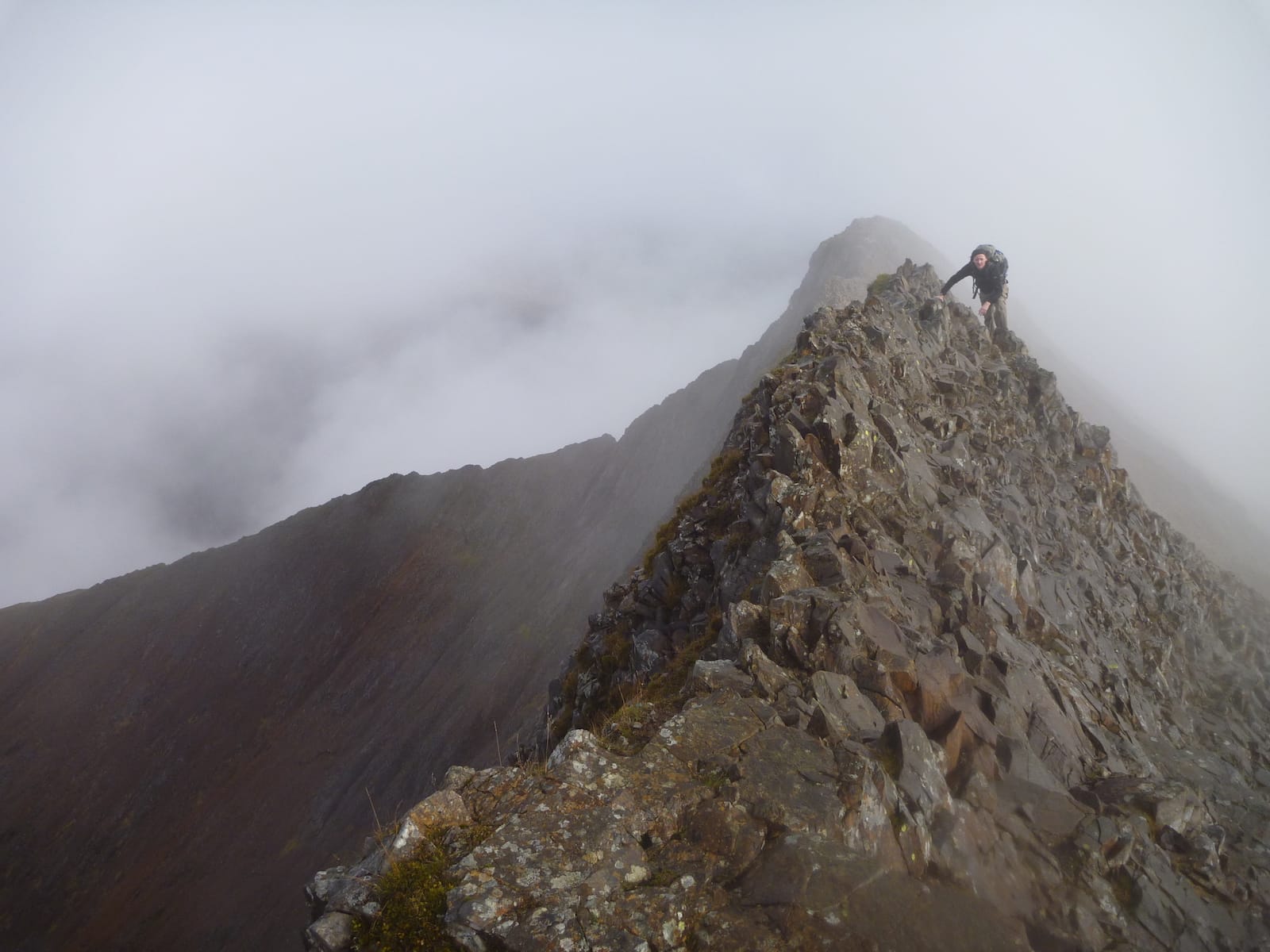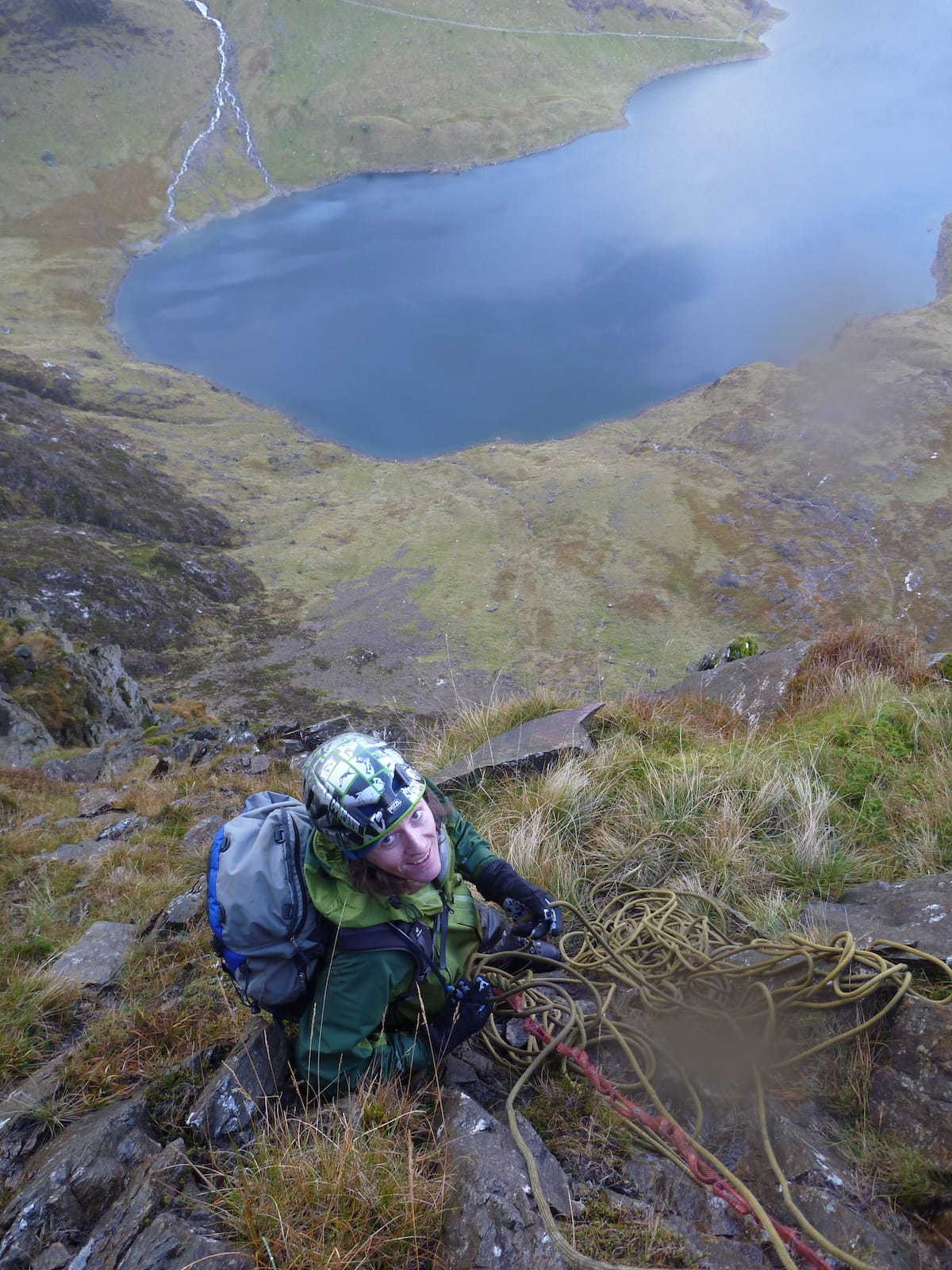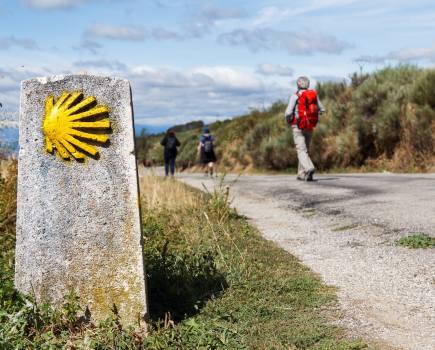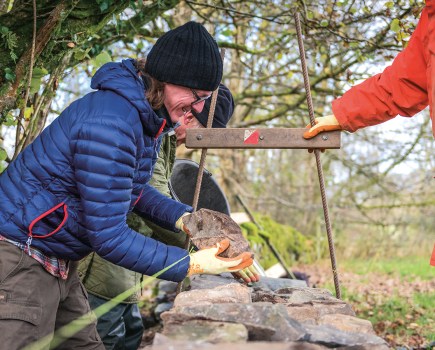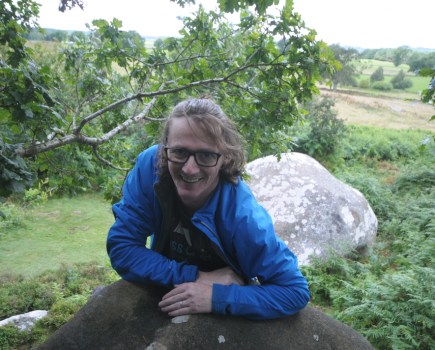The comedian spends a weekend in Snowdonia with climber, author and raconteur Andy Kirkpatrick grappling with cold scrambles and the Hull accent
Ed Byrne is currently touring Britain with his new show, Spoiler Alert, as part of which he shares some hilarious insights into the trips he’s made into the hills for The Great Outdoors magazine. To celebrate, we are publishing one of his archive features each week as a treat for Ed’s fans and readers of The Great Outdoors. Look out for the November issue of the magazine for his next one. Enjoy!
“I’ll have a kerk.”
“I’m sorry? A what?”
“Just a kerk.”
I’ve just asked multi-award-winning climber and writer, Andy Kirkpatrick, what he would like to drink. I’m having a beer and a scotch. He apparently wants something called a ‘kerk’, a drink I’m not familiar with. The confusion is cleared up when he uses its more formal title, “You know. Kerka Kerla.” “Aah.” I understand. “A Coke.” This would not be the first time over the course of the weekend that we would experience difficulties in communication.
The first thing that strikes you when you meet Andy Kirkpatrick, apart from his Hull accent, is how unpretentious and normal he is. Having read some of his work and knowing his reputation as a fearless climber of long cold routes, I was expecting a far more strident, extrovert type. I thought something between the macho ‘Off Roaders’ from The Fast Show and Lord Flashheart from Blackadder was going to stomp into the bar, crush my hand in a vice-like grip and ask me if I’m ready to make Snowdonia my bitch. Instead this almost meek and quite unprepossessing chap is asking me for a soft drink. I must say I was pretty relieved. A short while later, when describing his recent trip to El Capitan he referred to it as “the mountain Captain Kirk was climbing at the start of Star Trek 5.” I knew then we were going to get on just fine.
Partners in climb
The next morning we set off bright and early for Pen Y Pass car park. Did I say early? Not early enough. The car park was full and so we had to park down in Llanberis and get the bus back up. “I don’t know why it’s so busy,” said Andy, sounding genuinely baffled. “Because it’s Snowdonia on a Saturday,” I replied, starting to develop serious reservations about the competence of my guide for the weekend! Andy suggests we climb Lliwedd via a route called Bilberry Terrace. In the comfort and safety of my home office I read that Bilberry Terrace is the easiest way up Lliwedd and is actually a difficult and sustained scramble rather than a fully-fledged rock climb. However, the guidebooks I’ve consulted also say it should only be tackled in dry conditions by experienced climbers, putting us one experienced climber and one set of dry conditions short of the desired set of circumstances. Also, Andy’s less than slavish adherence to the route makes it hard to give our climb any kind of definite difficulty rating.
“Oh goodness me, what a bothersome set of circumstances,” I said. Or words to that effect
It certainly wasn’t easy, though. At one point while watching Andy ascend (on one of the pitches where it was possible for me to watch Andy ascend) I was put in mind of a routine Jerry Seinfeld used to do about New York cab drivers. As a passenger in a cab you feel somehow removed from the danger you’re in, like you’re watching the whole thing on TV. The driver is going 90mph the wrong way down a one-way street and you calmly sit there thinking: “That looked dangerous.” You get a very similar feeling climbing with Andy. I found myself watching him continue to climb without placing any gear in the rock and I know that if he falls he’s going to be too badly hurt to continue and I don’t have the experience to get myself off the mountain alone. Yet I’m just calmly thinking: “That looks dangerous.”
We also, as I hinted before, had some communication problems. Apart from the fact that in Andy’s accent the “Summit” could mean the top of the mountain or could be the opposite of “Nowt”, there were other more fundamental issues that probably stem from an experienced climber climbing with an inexperienced climber. At one point where it was likely that Andy and I would be out of each other’s range of hearing by the time he’d reached a new belay point he advised me: “When the rope goes tight, just start climbing.” It seemed like a reasonable instruction until it dawned on me that I was paying the rope out and as long as I continued to do that, it would never go tight. Did he mean, once we get to the end of the rope? What if he reached a belay point before then? In the end, Andy was able to scream loud enough to get me to start climbing. Despite numerous discussions afterwards, this issue of how I was supposed to know when to start climbing has never been resolved to my satisfaction!
Pitch imperfect
On the second to last pitch of our climb (incidentally the second of three pitches that Andy told me was the last pitch) was the point where things got the most stressful for me. I was climbing up a steep grassy bank on the furthest point to the left of the climb. Above me, Andy had climbed a fair way back to the right. This meant that the rope, because it hadn’t been fixed to that many points on the rock face, had managed to get snagged on a jagged piece of rock about six feet to my right and was preventing me from climbing any higher without unsnagging it. The rock that the rope had gotten snagged on actually looked like it had been specifically designed for the purpose of snagging ropes. I had visions in my head of a hairy old mountain couple, him leaving the house to check the rope traps he had set the night before to see if he’d caught any unsuspecting bits of rope stupid enough to wander into them, her waiting at home cooking up a delicious and warming pot of rope soup.
Clinging to the side of the mountain I kept trying to whip the rope over the rock in order to be able to keep ascending but it wouldn’t play ball. I yelled for Andy to pay out more rope so I could give it another go. Mishearing me, Andy pulled up the rope, drawing it even tighter into the rope trap, getting it stuck fast. “Oh goodness me, what a bothersome set of circumstances,” I said. Or words to that effect. It was then that I had one of those thoughts that show you how easy it is for accidents to happen on a mountain. I thought to myself, “If I just untie for a moment and climb up above the rock I can rejoin the rope and unsnag it from the other side. I’ll only be unroped for a few minutes.” In my head this was closely followed by a vision of Countryfile’s Matt Baker sitting in a studio, recording a voice over for the reconstruction of the accident, “It was then that the Irish funnyman made his fatal mistake and unclipped from the rope.” I decided instead to climb back down, unhook the rope from below and then climb back up again. Far less dramatic that way.
After one more uneventful pitch, we had reached the top. It took us a lot longer then we had hoped and it had been a lot more exciting than I’d expected. That night I watched Andy give a talk about his adventures to an audience of climbers at the Beacon Climbing Centre in Caernarfon. Andy’s talks are a lot like his climbs, seemingly haphazard but ultimately successful. He regaled them with tales of his recent climb up El Capitan with his 13-year-old daughter, his stories of enormous rock falls and epic adventures into the very extremes of what we, as humans, can survive. I saw then the gigantic gulf between what Andy was used to doing and what we had done that day and I realised what a pussy I was for whinging that a rope had been briefly caught on a rock a few hours earlier. Still, at least people know what I mean when I order a Coke.
This feature was first printed in The Great Outdoors, February 2013.
The trailer for the new film, Psycho Vertical, based on Andy Kirkpatrick’s book of the same name, was released yesterday. It looks pretty good:


